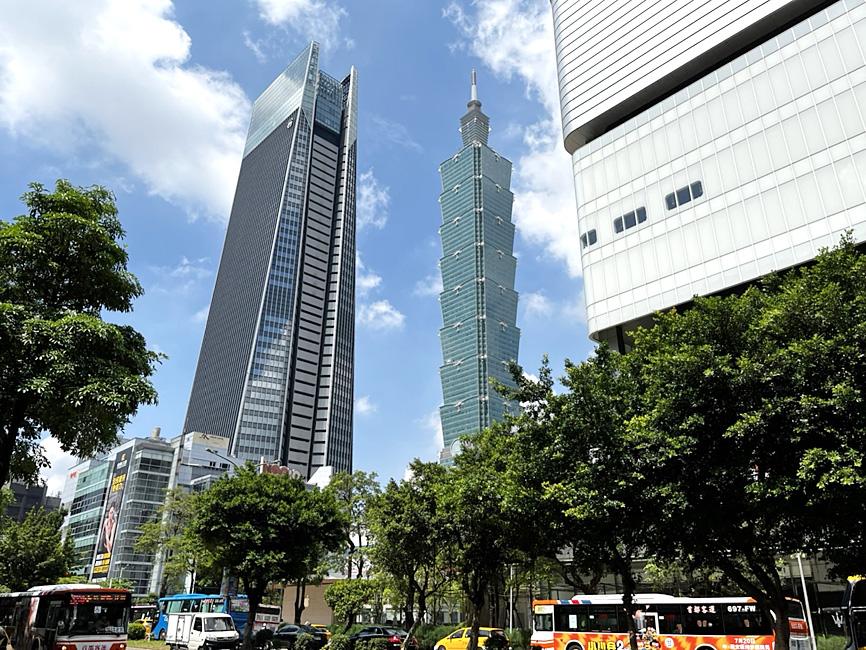The leasing market for upscale offices in Taipei has shown resilience, favoring landlords, despite an economic slowdown and a surge in COVID-19 cases, property consultancy Knight Frank LLP said in a report yesterday.
Taipei, Seoul and Ho Chi Minh City, Vietnam, were the only three cities among 23 analyzed in the region where demand for “grade A” office space was strong in the first half, the report said, adding that the others showed cautious sentiment.
Seoul was the top performer by vacancy rate at 1.6 percent last quarter, followed by Taipei’s 2.43 percent as the effects of the COVID-19 outbreak faded, it said.

Photo: Hsu Yi-ping, Taipei Times
Vacancy rates were 45 percent in Phnom Penh, 28 percent in Kuala Lumpur, 27 percent in Jakarta, 20 percent in Mumbai, India, 19 percent in Manila and above 10 percent in China’s tier-one cities, Knight Frank said, adding that the numbers meant tenants had the upper hand in those markets.
A tech boom in the local market pushed the vacancy rate down to 1.9 percent last quarter, making Taipei one of the few cities with a positive cyclical movement, even amid a spike in virus cases, it said.
Average rent for grade A offices in Taipei rose 1 percent in the April-to-June period, accelerating from a 0.8 percent increase in the first quarter, Knight Frank said.
The trend suggests an end to rent corrections of 7 percent earlier in the pandemic, it said.
Rent rates have returned to pre-outbreak levels in more than 50 percent of the Taipei areas it analyzed, the report said.
For the whole of this year, rent increases might surpass 2 percent, it said.
Taipei had a healthy showing even with some cryptocurrency firms downsizing or exiting the market amid wild financial market swings, interest rate hikes and rising inflation, it said.
Monthly rents averaged NT$4,039 per ping (3.3m2) in the city’s prime Xinyi District (信義), up from NT$3,847 per ping three months earlier, it said.
The leasing market in Taipei would remain vibrant, as labor shortages and price increases for building materials have prompted developers to suspend or postpone construction of new office buildings, which would ease rent correction pressure compared with if a large supply were to become available next year, Knight Frank said.
A full reopening of Taiwan’s borders would help attract foreign investment, boosting demand for office space, it said.
In the meantime, landlords are adopting coworking business models to enhance floor efficiency and rent income, it said.

Hong Kong authorities ramped up sales of the local dollar as the greenback’s slide threatened the foreign-exchange peg. The Hong Kong Monetary Authority (HKMA) sold a record HK$60.5 billion (US$7.8 billion) of the city’s currency, according to an alert sent on its Bloomberg page yesterday in Asia, after it tested the upper end of its trading band. That added to the HK$56.1 billion of sales versus the greenback since Friday. The rapid intervention signals efforts from the city’s authorities to limit the local currency’s moves within its HK$7.75 to HK$7.85 per US dollar trading band. Heavy sales of the local dollar by

Taiwan Semiconductor Manufacturing Co’s (TSMC, 台積電) revenue jumped 48 percent last month, underscoring how electronics firms scrambled to acquire essential components before global tariffs took effect. The main chipmaker for Apple Inc and Nvidia Corp reported monthly sales of NT$349.6 billion (US$11.6 billion). That compares with the average analysts’ estimate for a 38 percent rise in second-quarter revenue. US President Donald Trump’s trade war is prompting economists to retool GDP forecasts worldwide, casting doubt over the outlook for everything from iPhone demand to computing and datacenter construction. However, TSMC — a barometer for global tech spending given its central role in the

The Financial Supervisory Commission (FSC) yesterday met with some of the nation’s largest insurance companies as a skyrocketing New Taiwan dollar piles pressure on their hundreds of billions of dollars in US bond investments. The commission has asked some life insurance firms, among the biggest Asian holders of US debt, to discuss how the rapidly strengthening NT dollar has impacted their operations, people familiar with the matter said. The meeting took place as the NT dollar jumped as much as 5 percent yesterday, its biggest intraday gain in more than three decades. The local currency surged as exporters rushed to

PRESSURE EXPECTED: The appreciation of the NT dollar reflected expectations that Washington would press Taiwan to boost its currency against the US dollar, dealers said Taiwan’s export-oriented semiconductor and auto part manufacturers are expecting their margins to be affected by large foreign exchange losses as the New Taiwan dollar continued to appreciate sharply against the US dollar yesterday. Among major semiconductor manufacturers, ASE Technology Holding Co (日月光), the world’s largest integrated circuit (IC) packaging and testing services provider, said that whenever the NT dollar rises NT$1 against the greenback, its gross margin is cut by about 1.5 percent. The NT dollar traded as strong as NT$29.59 per US dollar before trimming gains to close NT$0.919, or 2.96 percent, higher at NT$30.145 yesterday in Taipei trading